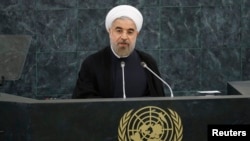Iranian President Hassan Rouhani has said he wants a deal with the West on his country's nuclear program in as little as three months.
President Rouhani told The Washington Post on Wednesday that Iran is willing to take unspecified transparency measures to demonstrate that its nuclear program is peaceful.
The comments came a day before the resumption of international talks on Iran's uranium enrichment program, which many Western powers suspect is aimed at building a bomb.
Rouhani said the "only way forward" is for a timeline to be inserted into the talks. He said Tehran is open to a three- or six-month timetable, but that a quicker deal is "more beneficial to everyone."
Echoing recent comments, Rouhani insisted Iran's Supreme Leader Ali Khameini has given him full authority to solve the nuclear issue. If such a deal could be reached, he said it could serve as a "beginning point" toward improving relations with Washington. The two countries have not had diplomatic relations since 1980.
Earlier on Wednesday, Rouhani explained that he did not shake hands with President Barack Obama at the United Nations this week because the timing was not right, and said that he was open to a future meeting with the U.S. leader.
Thursday will see the highest level interaction in six years between Washington and Tehran when U.S. Secretary of State John Kerry and Iranian Foreign Minister Mohammad Javad Zarif attend the so-called P5+1 talks. The meeting in New York includes the five permanent members of the U.N. Security Council plus Germany.
The talks, which will take place on the sidelines of the U.N. General Assembly, are seen as a key test of Iran's commitment to resolving the nuclear issue.
At his speech to the General Assembly on Tuesday, Rouhani repeated Iran's long-standing demand that world leaders recognize its right to continue enriching uranium for peaceful purposes.
The U.S. and its allies suspect the program is secretly aimed at building a bomb, and have helped implement several rounds of sanctions that have crippled Iran's economy.
U.S. officials have been welcoming of the new attitude seeming to come out of Iran, especially in comparison to Rouhani's fiery predecessor, Mahmoud Ahmadinejad. However, despite the warmer sentiments, officials say they are looking for concrete actions to back up the words.
Earlier, Rouhani appeared to distance himself further from Ahmadinejad when he told reporters the Nazi Holocaust against Jews was a crime that cannot be ignored. Ahmadinejad, who completed his second term as president in August, repeatedly denied the Holocaust.
However, Rouhani also said it is important that Holocaust victims not "victimize" others -- a reference to Israel's occupation of the Palestinian territories.
President Rouhani told The Washington Post on Wednesday that Iran is willing to take unspecified transparency measures to demonstrate that its nuclear program is peaceful.
The comments came a day before the resumption of international talks on Iran's uranium enrichment program, which many Western powers suspect is aimed at building a bomb.
Rouhani said the "only way forward" is for a timeline to be inserted into the talks. He said Tehran is open to a three- or six-month timetable, but that a quicker deal is "more beneficial to everyone."
Echoing recent comments, Rouhani insisted Iran's Supreme Leader Ali Khameini has given him full authority to solve the nuclear issue. If such a deal could be reached, he said it could serve as a "beginning point" toward improving relations with Washington. The two countries have not had diplomatic relations since 1980.
Earlier on Wednesday, Rouhani explained that he did not shake hands with President Barack Obama at the United Nations this week because the timing was not right, and said that he was open to a future meeting with the U.S. leader.
Thursday will see the highest level interaction in six years between Washington and Tehran when U.S. Secretary of State John Kerry and Iranian Foreign Minister Mohammad Javad Zarif attend the so-called P5+1 talks. The meeting in New York includes the five permanent members of the U.N. Security Council plus Germany.
The talks, which will take place on the sidelines of the U.N. General Assembly, are seen as a key test of Iran's commitment to resolving the nuclear issue.
At his speech to the General Assembly on Tuesday, Rouhani repeated Iran's long-standing demand that world leaders recognize its right to continue enriching uranium for peaceful purposes.
The U.S. and its allies suspect the program is secretly aimed at building a bomb, and have helped implement several rounds of sanctions that have crippled Iran's economy.
U.S. officials have been welcoming of the new attitude seeming to come out of Iran, especially in comparison to Rouhani's fiery predecessor, Mahmoud Ahmadinejad. However, despite the warmer sentiments, officials say they are looking for concrete actions to back up the words.
Earlier, Rouhani appeared to distance himself further from Ahmadinejad when he told reporters the Nazi Holocaust against Jews was a crime that cannot be ignored. Ahmadinejad, who completed his second term as president in August, repeatedly denied the Holocaust.
However, Rouhani also said it is important that Holocaust victims not "victimize" others -- a reference to Israel's occupation of the Palestinian territories.





